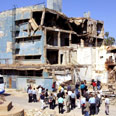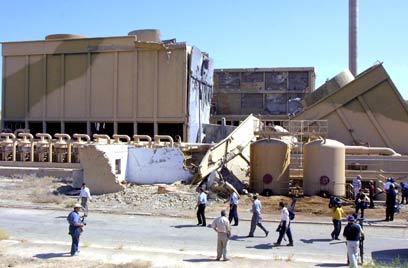
Scientist: Israeli strike triggered Iraqi nuclear program
Former Iraqi scientist tells BBC website Israeli attack on Osirak reactor 25 years ago jump-started country's nuclear program; says Iraq's experience benefited Iran
The BBC interviewed Khadduri as part of a series marking 25 years since Israel bombed Iraq's Osirak nuclear reactor. According to the scientist, it was only after the Israeli strike that the Iraqis decided to launch a large-scale nuclear enrichment project.

Osirak reactor ruins as photographed in 2002 (Photo: AFP)
"Until Israel's attack, we were only dabbling with some calculations relating to nuclear fuel burn-up and criticality calculations - nothing sophisticated and focused. After the Israeli attack, we discussed among ourselves our gut reaction that a political decision would now come forth ordering us to make the bomb. Soon enough, it did," he described.
"We were psychologically ready for it. We embarked upon it whole-heartedly. Investment and resources were heavily poured into the program over the next 10 years," he added.
'Iran benefited from Iraq's experience'
Khadduri also claimed that "Iraq managed exceedingly well in hiding the scope of its program from foreign intelligence eyes - whether it was Mossad, the CIA or MI6 - until after the 1991 (Gulf) war."
"When the IAEA inspectors arrived they finally managed to put the pieces of the program together on the ground, but only over a period of one year after that war," he told the BBC.
The former Iraqi scientist said that Iran benefited from Iraq's experience in its nuclear weapon program, and that it is now more prepared in terms of security and "deep covertness" to hiding its nuclear work from the world.
"A tight security apparatus and tight control - like that in Iraq during the 1980s when it engaged fully in its nuclear weapon program - ensures Iran against actual spies roaming around, or inside, its nuclear establishments," Khadduri stated.
"That would be the only reliable source on the scope of their program," he concluded.










